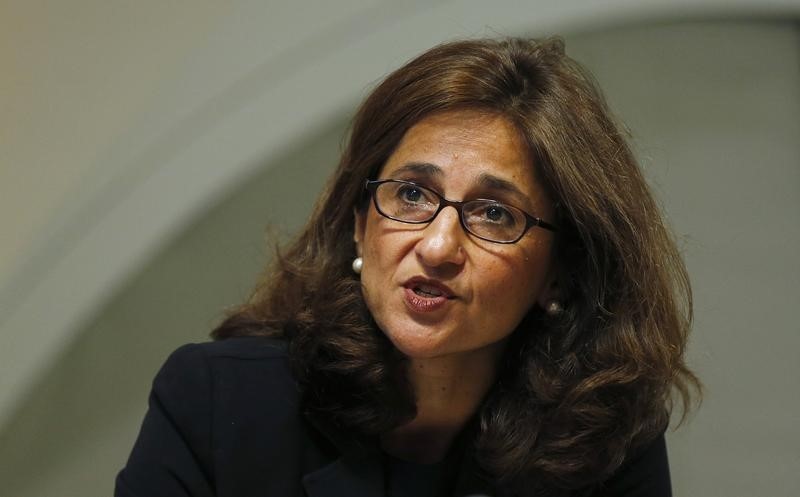LONDON (Reuters) - The Bank of England is not wrong-footing investors and households with its various signals on when interest rates might start to rise, a deputy governor at the central bank said on Friday.
Sterling and British government bond yields fell sharply on Thursday after the Bank surprised investors by giving no clear sign about when interest rates might go up for the first time before the financial crisis.
Governor Mark Carney said the Bank would move when the time was right, in contrast with the U.S. Federal Reserve which has shown it might raise U.S. rates next month. Carney had previously said a decision on whether to raise rates would come into sharper focus around the turn of the year.
In an interview on BBC radio on Friday, Deputy Governor Minouche Shafik denied that the Bank's attempts to give guidance on its plans for interest rates had been a failure.
"I don't think that's the case. Isn't it better that the Bank of England give the public and the markets a sense of what our best collective judgement is of what's going to happen in the economy than to catch people by surprise?," Shafik said.
Since he arrived at the Bank in 2013 after running the Bank of Canada, Carney has given various messages about what is likely to happen with interest rates.
In a first version of its so-called forward guidance, the Bank said it would not think about raising rates until unemployment fell to 7 percent. But the jobless rate then plunged below that level much more quickly than it had forecast.
Last year, Carney surprised investors by saying rates might rise more quickly than markets expected. Then a slump in global oil prices pushed British inflation below zero and took a rate hike back off the table.
Shafik said the Bank's most important message for investors over the last couple of years was that interest rates were likely to go up only slowly and to a level lower than before the financial crisis.
"I think the consistent message that we have given is that future interest rate rises will be limited and gradual, and I think everybody on the Monetary Policy Committee signs up to that guidance and so far that has proven to be right," she said.
Shafik also said Britain's labour market will start to tighten in the coming months as the economy approaches full employment.
"We are over time seeing a situation where there are recruitment difficulties in many parts of the country, employers are having to bid up wages," Shafik said.

The Bank is watching the labour market closely for signs that inflation pressures are building. Asked if conditions in the British economy might justify a rate hike already while concerns about the global economy meant a hike was not appropriate, Shafik said: "That's correct."